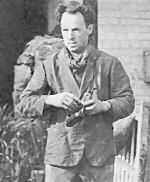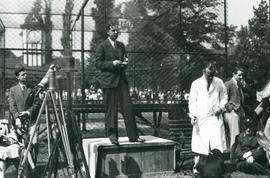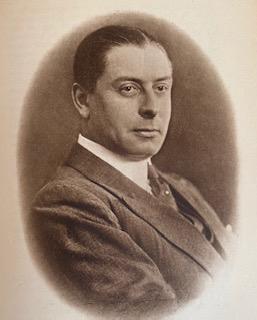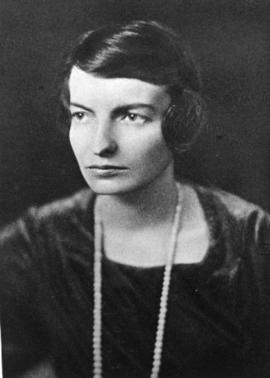Ronald Mathias Lockley was a Welsh ornithologist and naturalist. He wrote over 50 books on natural history, including a major study of shearwaters. He is perhaps best known for his book The Private Life of the Rabbit
Barlow was born in South Mimms, Hertfordshire, to his father Thomas WIlliam, a Clerk. He was educated at Blundell's School, after which in 1816 he started attending Trinity College, Cambridge. He earned his BA in 1820 and his MA in 1823. In 1822 he became the curate of the parish of Uckfield, Sussex. On 23rd March 1823 he was ordained as a priest. From 1830-1843 he was rector to the parish in Little Bowden, Northamptonshire. In 1824 he married Cecilia Anne Lam.
In 1832 Barlow joined the Royal Institution of Great Britain and he would serve many positions including Manager (1838), Secretary of the Lectures Committee (1841) and Honorary Secretary (1843-1860. Barlow was elected into the Royal Society in 1834 and served as Secretary of the Zoological Society of London from 1837-1838.
In 1851 Barlow became minister of the Duke Street Chapel, London and from 1854-1859 he was Chaplain-in-Ordinary at Kensington Palace.
Sclater was born at Tangier Park, Wootton St Lawrence, Hampshire, where his father William Lutley Sclater had a country house. George Sclater-Booth, 1st Baron Basing was his elder brother. Philip grew up at Hoddington House where he took an early interest in birds. He was educated in school at Twyford, Winchester College and Corpus Christi, Oxford, where he studied scientific ornithology. In 1851 he began to study law and was admitted as a Fellow of Corpus Christi College. In 1856 he travelled to America and visited Lake Superior and the upper St. Croix River. Sclater wrote about this in his 'Illustrated Travels'. In Philadelphia he met Spencer Baird, John Cassin and Joseph Leidy at the Academy of Natural Sciences. After returning to England, he practiced law for several years and attended meetings of the Zoological Society of London.
In 1858 Sclater published a paper in the Proceedings of the Linnean Society, setting up six zoological regions which he called the Palaeartic, Aethiopina, Indian, Australasian, Neartic and Neotropical, which are still in use. He also developed the theory of Lemuria during 1864 to explain zoological coincidences relating to Madagascar to India.
He was Secretary of the Zoological Society of London for 42 years, from 1860-1902. He was briefly succeeded by his son, before the Council of the Society made a long-term appointment.
In 1874 he became private secretary to his brother George Sclater-Booth, MP. In 1875 he became President of the Biological Section of the British Association for the Advancement of Science, where he joined in 18447 as a member. He was elected as a member to the American Philosophical Society in 1873.
Sclater was the founder and editor of 'The Ibis', the journal of the British Ornithologists' Union. His office at 11 Hanover Square became a meeting place for all naturalists in London.
His collection of birds grew to nine thousand and he transferred them to the British Museum in 1886. At around the same time the museum was augmented by the collections of Gould, Salvin and Godman, Hume and others to become the largest in the world.
Among Sclater's books were 'Exotic Ornithology' (1866-1869), 'Nomenclator Avium' (1873), 'Argentine Ornithology' (1888-1889) and 'The Book of Antelopes' (1894-1900).
In June 1901 he received an honorary doctorate of Science from the University of Oxford.
In 1862 he married Jane Eliza Hunter Blair and they had one daughter and four sons. Their eldest son, William Lutley Sclater was also an ornithologist. Philip Sclater is buried in Odiham Cemetery.
Huxley was an English evolutionary biologist, eugenicist and internationalist. He was a proponent of natural selection and a leading figure in mid-twentieth century modern synthesis. He was Secretary of the Zoological Society of London 1935-1942, the first Director of UNESCO, a founding member of the World Wildlife Fund, the President of the British Eugenics Society 1959-1962, and the first President of the British Humanist Association.
He was well known for his presentation of science in books and articles, and on radio and television. He directed an Oscar winning wildlife film. He was awarded UNESCO's Kalinga Prize for the popularisation of science in 1953, the Darwin Medal of the Royal Society in 1956, and the Darwin-Wallace Medal of the Linnaean Society on 1958. He was knighted in 1958. In 1959 he received a Special Award of the Lasker Foundation in the category Planned Parenthood - World Population.
In 1935 Huxley was appointed Secretary to the Zoological Society of London, and spent much of the next seven years running the society and its zoological gardens, London Zoo and Whipsnade Park, alongside his writing and research. Huxley introduced a range of ideas for making the Zoo child friendly. He fenced off the Fellow's Lawn to establish Pets Corner, appointed new assistant curators who he encouraged to talk to children, and he initiated the Zoo Magazine.
Born in 1888, the son of herpetologist George Albert Boulenger. He was curator of reptiles at London Zoo from 1911-1924, and then director of the aquarium from 1924 to 1943.
Joan Beauchamp Procter was a British zoologist and herpetologist. She worked initially at the British Museum (Natural History) and later at the Zoological Society of London, as the first female Curator of Reptiles at London Zoo. She undertook substantial taxonomic work and made innovative contributions to veterinary practice and zoo displays. She wrote scientific and popular zoological articles, including early accounts of the behaviour of captive komodo dragons.




